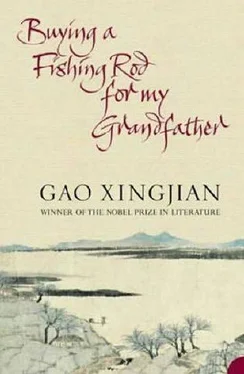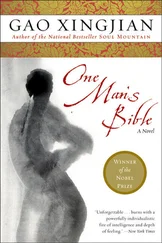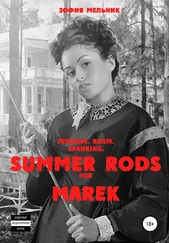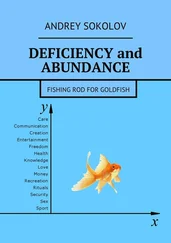"It's Sunday today, so I brought him out," he replied.
We were so engrossed with our own holiday that we had forgotten what day of the week it was. Fangfang took a bite of the melon and smiled at me to indicate that he was a good man. There are, in fact, many good people in the world.
"Eat it. It's from Uncle and Auntie over there," he said to the boy, who was staring at the cream cake on top of his bag. The boy had grown up in this town and had clearly never seen such a cake. He took it and ate it right away.
"Is he your son?" I asked.
The man didn't reply, but said to the boy, "Take some melon and go play. I'll catch grasshoppers for you later."
"I want to catch five of them!" the boy said.
"All right, we'll catch five."
The man watched as the boy ran off with the wire cage in his hand. There were deep creases at the corners of his eyes.
"He isn't my son," he said, looking down and taking out a cigarette. He struck a match and dragged hard. Then, sensing our surprise, he added, "He's the child of my paternal cousin. I want to adopt him, but it depends on whether he's willing to come and stay with me."
Suddenly we understood that this stern man's heart was churning with emotion.
"What about your wife?" Fangfang couldn't help asking. There was no reply. He puffed hard on his cigarette, got up, and left.
We felt the chill of the mountain air. On the brilliant yellow tiles, the fresh grass that had sprouted in the spring was as tall as the old, withered stalks, and both swayed in the breeze. In the blue sky, a floating cloud that seemed to hang on the corner of a flying eave created the impression that the temple itself was tilting. A broken tile at the edge of the eave looked as if it were about to fall. Probably it had sat that way for years without falling.
The man was standing on a mound that had once been a wall, and for a long time he just stared out at the mountains and valleys. In the distance the ridges were higher and steeper than the hill we were on, but on the mountain slopes there were no terraced fields and no houses to be seen.
"You shouldn't have asked him," I said.
"Oh stop." Fangfang looked upset.
"There's a grasshopper here!" came the boy's voice from the other side of the hill. It seemed far away but was quite clear.
The man strode off in that direction, swinging the bag of rock melons as he disappeared from sight. I put a hand on Fangfang's shoulder and pulled her toward me.
"Don't." She turned away.
"There's a bit of grass in your hair," I explained, removing a pine needle that had stuck to her hair.
"That tile is about to fall," Fangfang said. She, too, had noticed the broken tile hanging there precariously. "It would be good if it fell. Otherwise it might injure someone," she mumbled.
"It might be a while before it does fall," I said.
We walked to the mound where the man had been standing. In the valley there was a stretch of farmland, dense crops of luxuriant green barley and broomcorn millet, waiting for the autumn harvest. Below us, on a level part of the slope, stood a few mud huts, their bottom halves newly coated in brilliant white lime. The man was holding the boy's hand as they made their way down a small winding track, past the huts and through the crops. Suddenly, like a colt that had broken free of its reins, the boy bolted off, dashing ahead, then turning and running back. He seemed to be waving the cage at the man.
"Do you think the man caught grasshoppers for him?" Fangfang, do you remember asking me that?
"Of course," I said. "Of course."
"He caught five of them!" you said cheekily.
Well, that's the Temple of Perfect Benevolence that we visited on our honeymoon, and which I wanted to describe for all of you.
"I haven't strolled in a park for a long time. I never have the time to spare, or the inclination anymore."
"It's the same with everyone. After work, people just hurry home. Life's always a rush."
"I remember when I was a child, I really liked coming to this park to roll around on the grass."
"I used to come with my father and mother."
"I really liked it when there were other children."
"Yes."
"Especially when you were there as well."
"I remember."
"At the time, you had two little plaits."
"At the time, you always wore dungarees, and you were very cocky."
"You were unfriendly, always haughty."
"Really?"
"Yes, nobody would dare antagonize you."
"I don't remember, but I liked playing with you and I even used to kick a rubber ball with you."
"Nonsense, you didn't ever kick a rubber ball! You used to wear little white shoes and were always afraid of getting them dirty."
"That's right, when I was little I was really fond of wearing white sneakers."
"You were like a princess."
"Sure – a princess wearing sneakers."
"Then your family moved."
"That's right."
"At first you often came to visit on Sundays, but later on not as much."
"I had grown up."
"My mother really liked you."
"I know."
"There were no daughters in our family."
"Everyone said we looked alike, like an older sister and a younger brother."
"Don't forget we're the same age, that I'm two months older."
"But I seemed older than you; I was always taller by a hand, as if I were your older sister."
"At the time, girls got tall earlier. Enough of that, let's talk about something else."
"What will we talk about, then?"
The path under the trees has clipped Japan cypresses growing on both sides. On the slope behind the cypresses, a young woman wearing a dress and carrying a red handbag sits down on a stone bench.
"Let's sit down awhile, too."
"All right."
"The sun's about to set."
"Yes, it's beautiful."
"I don't like this artificial sort of beauty."
"Didn't you say you liked going to parks?"
"That was when I was little. I've lived in the mountain regions. I was a woodcutter for seven years in primitive forests."
"You managed to survive."
"Forests are really awesome."
The young woman wearing a dress gets up from the stone bench and looks to the end of the shady path beyond the neatly clipped cypresses. Several people are coming from that direction, among them a tall youth with hair over his temples. Beyond the treetops and the wall, the sky is infused with brilliant red and purple-red colors of the sunset, and rippling clouds begin to spread overhead.
"I haven't seen a beautiful sunset like this for a long time. The sky seems to be on fire."
"It's like a wildfire."
"Like what?"
"It's like a forest wildfire…"
"Well, keep talking."
"When there's a forest wildfire, the sky is just like this. The fire spreads swiftly and with a vengeance, and there's not time to cut down the forest. It's really terrifying. All the felled trees fly into the air, and from a distance they look like bits of straw drifting up in a fire, and crazed leop ards come out of the forests to throw themselves into the rivers, swimming right at you – "
"Don't the leopards attack people?"
"They're past thinking about that."
"Can't you use your rifles on them?"
"People are also traumatized; from riverbanks they just stare vacantly at the fire."
"Isn't there anything that can be done?"
"Mountain streams can't stop it. The trees on the other side get scorched, start crackling, and suddenly they're alight. For a distance of more than several li around it's so smoky and hot, you can't breathe. All you can do is wait for the wind to change or for the fire to get to the river, exhaust itself, and burn out."
The young woman in the dress sits down again on the stone bench; her red handbag is beside her.
Читать дальше
Конец ознакомительного отрывка
Купить книгу












